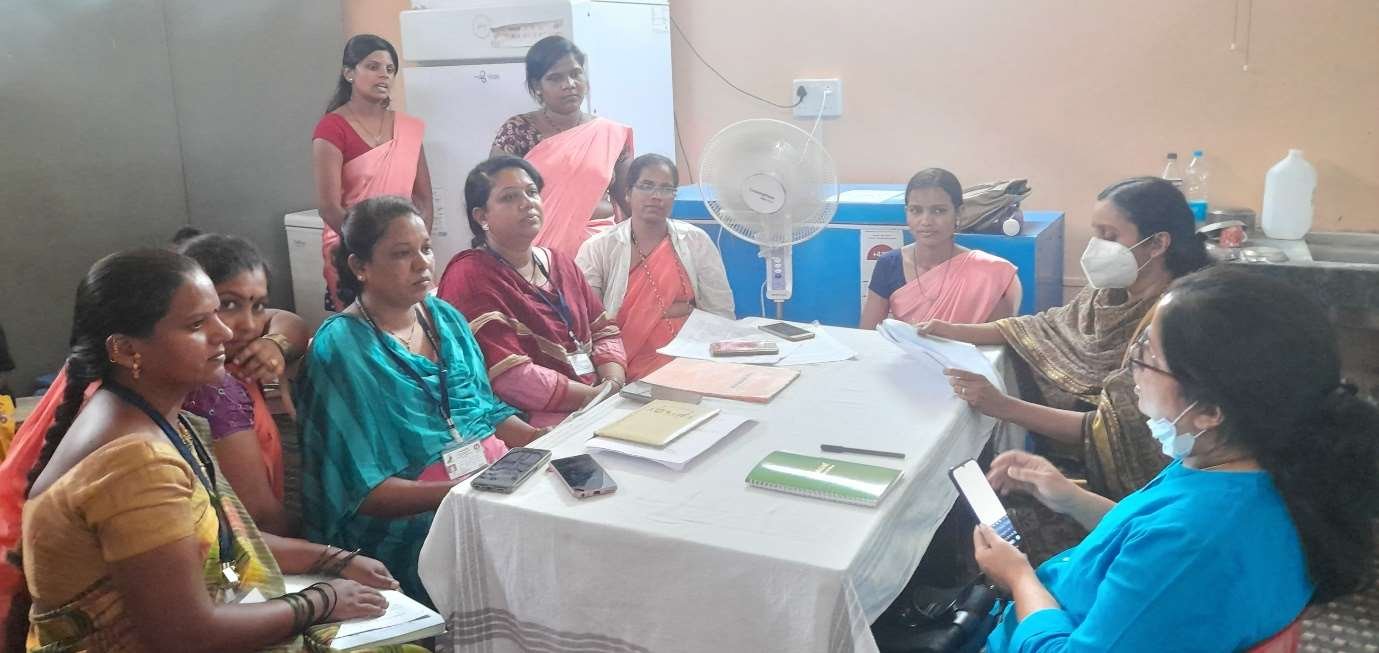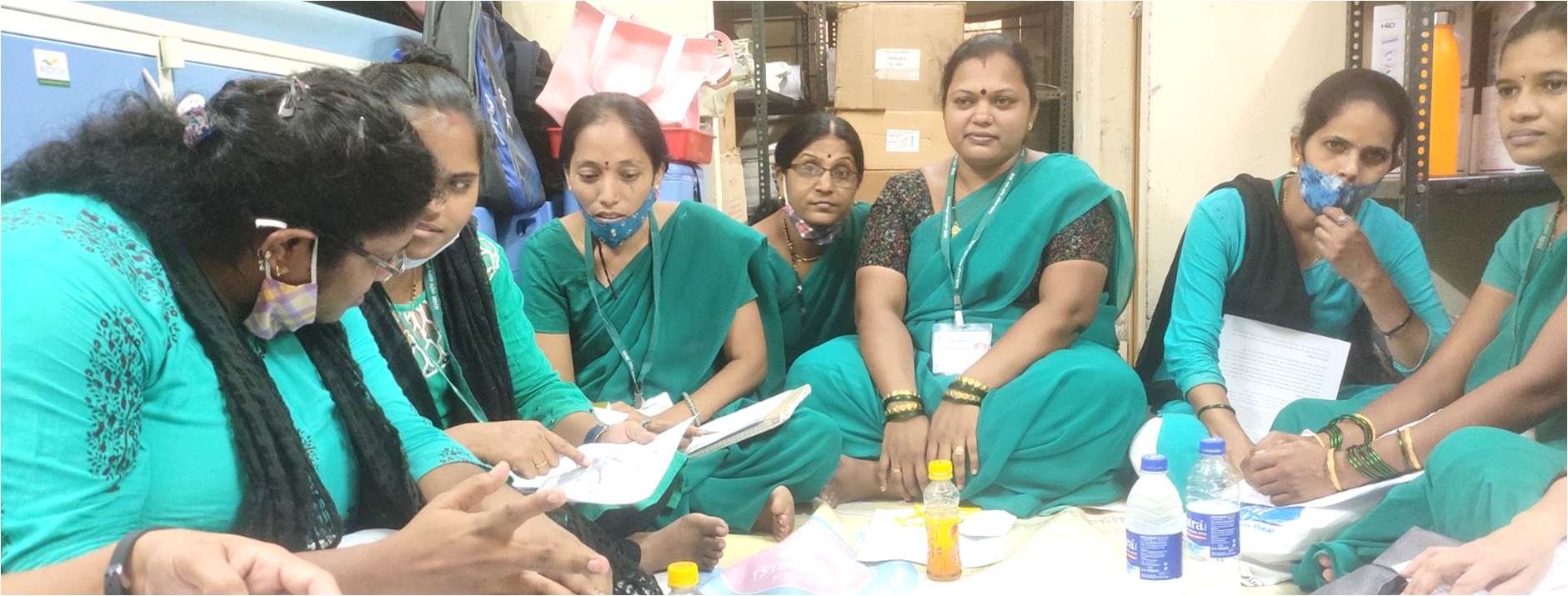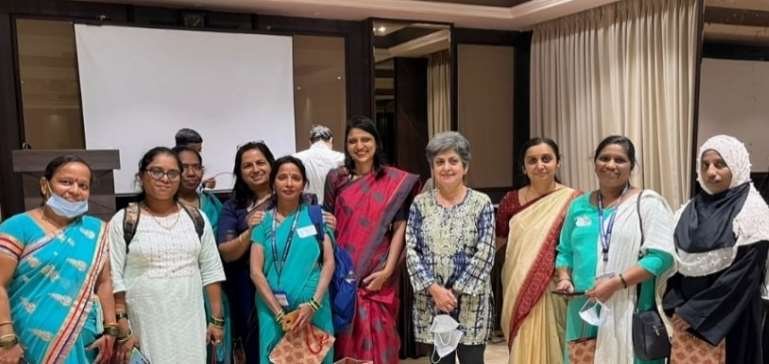|
Women in Science Mentoring Program (2020)
Assessing preparedness of urban community health workers for tuberculosis (TB) control- An exploratory study in two cities of India
PI: Shilpa Karvande, Foundation for Medical Research, India
Project Dates: March 2022 - February 2023
 | | Focus group discussion of urban ASHAs. Photo credit: Dr. Karvande |  | | Urban ASHAs referring to picture cards used during focus group discussion. Photo credit: Dr. Karvande |  | | Urban ASHAs with the PEER team. Photo credit Dr. Karvande |
Community health workers in urban areas of India (urban Accredited Social Health Activists, or ASHAs) are now involved in a biannual active tuberculosis (TB) case finding survey and have recently started working as TB treatment supporters. Scientific research on urban ASHAs’ preparedness in general and particularly in supporting TB care and patients is limited. Their counterparts in rural settings have been relatively more studied and reviewed. This PEER project was therefore undertaken to evaluate the ASHA program in Mumbai and Pune, specifically to assess their preparedness for TB control. The research focused on the needs of community health workers specific to urban settings.
The project also supported the research and mentorship of five young female scientists, and the initial results have opened several avenues for developing research and intervention ideas for TB patients and urban community health workers. Dr. Karvande and her colleagues also made specific recommendations for the improvement of the TB program, including capacity building for urban ASHAs and better placement of these workers within the primary health system.
Final Summary of Project Activities
The researchers selected areas within the two cities with a greater number of working ASHAs and a relatively higher burden of TB in consultation with city program officials. Fifty percent of the urban ASHAs working in these areas were surveyed (n = 222), selected by the proportionate random sampling technique, and participants of qualitative components of this research were selected purposely. Both components sought to understand ASHA knowledge related to TB training, their role in TB care, their perceptions regarding TB and nutrition, stigma, and people-centered care.
The PEER team found TB-related knowledge was generally low. Only about 30% of the ASHAs surveyed could identify symptoms other than cough and weight loss, while fewer than 2% knew about diagnostic tests such as nucleic acid amplification tests and culture drug susceptibility testing. Knowledge of contact tracing and prevention strategies beyond cough etiquette were below 20%, while knowledge of adverse drug reactions and information about the TB direct benefit transfer were below 50%.
The researchers reported that these and other subjects were not covered in-depth during the existing half-day session of TB training for ASHAs. Among the key suggestions for better supervision and reporting by the stakeholders were standard templates for home-visit interaction and inclusion of TB indicators in routine reporting. Stigma was another key issue identified. More than half of the ASHAs (57.7%) perceived TB patients faced stigma. Fear among TB patients in sharing their diagnosis affected the urban ASHAs in their role of TB control.
The young female scientists in this PEER project gained skills through semi-structured interviews with ASHAs, and three of the five mentees have continued on to PhD programs in public health. All mentees took online classes to develop effective skills in writing and formatting scientific manuscripts and grant proposals and in dealing with ethical issues in publication. They discussed these topics during regular in-person mentoring sessions. One mentee joined the data collection phase as part of her summer internship program and learned about data collection and tuberculosis more widely.
The research team shared the results of this study with key Mumbai city officials and TB program officials. The findings also inspired three newspaper articles, in the Hindustan Times, the Times of India, and Sakal, a local Marathi-language newspaper.
Publications:
Purohit, V. S., Karvande, S. S., Shah, D. Y., Vallepawar, O. B., Yadav, O. J., & Mistry, N. F. (2025). Engagement and Preparedness of Urban Accredited Social Health Activists (U-ASHAs) for Delivery of Tuberculosis (TB) Care: Findings From two Cities in Maharashtra, India. Indian Journal of Community Medicine, 50(1), 225–229. https://doi.org/10.4103/ijcm.ijcm_744_23
Back to WSMP Grant Recipients
|
|
|
|






